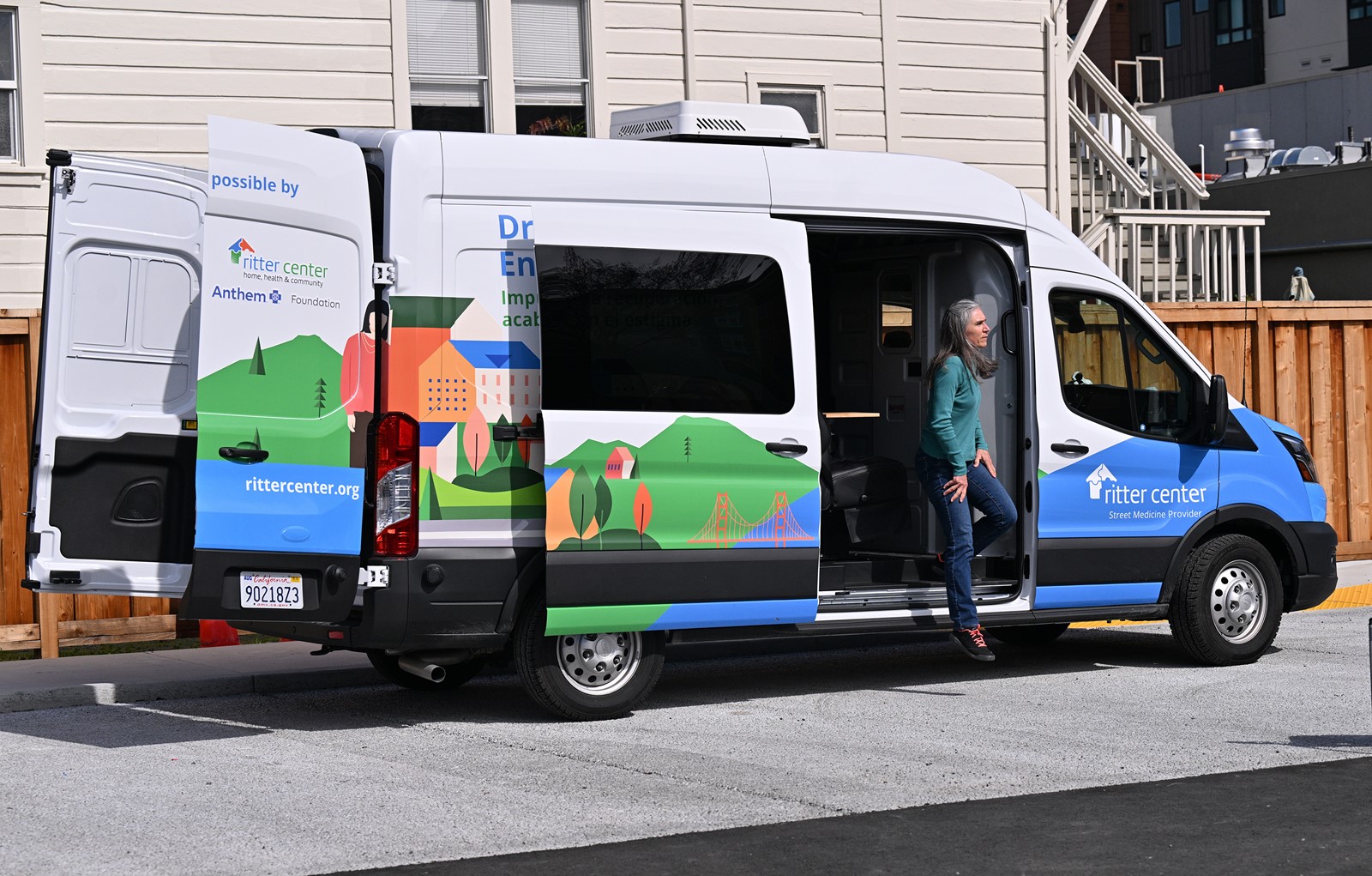
The Ritter Center in San Rafael has added a new van to its mobile health care fleet.
The center’s behavioral health services van was unveiled Friday at 800 A St. in San Rafael, the nonprofit’s future home. The van will bring mental health and substance use treatment to people across Marin County.
“As I see outreach, it’s like you can have all the great services in the world, but if people aren’t coming to you, so what,” said Mark Shotwell, the chief executive officer of the Ritter Center. “So this is the opportunity to go to where people are, to make it as easy as possible for them to be able to get what they need.”
Ritter Center largely serves unhoused people, but also people at risk of becoming homeless, like those on a fixed income or living paycheck-to-paycheck, Shotwell said. The center provides health care services to anyone who needs them — such as primary care, therapy, psychiatry and substance use disorder assistance — but also helps with housing and food.
“The Ritter Center continues to strengthen our community by providing essential services for our most vulnerable residents, ensuring they receive the care and support they need,” said Marin County Supervisor Brian Colbert, who viewed the van on Friday. “This mobile service is a critical opportunity to expand access to care for those who need it most, breaking down barriers to health and well being.”
Shotwell said the van will be focused on expanding the center’s substance abuse services and “eliminating” harm caused by addiction, such as overdosing.
Overdose is the leading cause of death for residents under age 55 in the county, with fentanyl associated with around 60% of related fatalities. The county had 410 non-fatal overdoses in 2024; statistics for fatal overdoses that year have not yet been released. In 2023, there were 453 non-fatal overdoses and 60 fatal overdoses, according to OD Free Marin.
Shotwell said the van will be a repository for supplies — a grant helped buy “tens of thousands” of supply kits — as well as medicine associated with drug use, like the overdose-reversing drug Naloxone, often called by its brand name Narcan.
“We want to get Narcan out as far and as wide as we can in the county because every family, every student, every teacher, hopefully eventually every resident of Marin having Narcan means that anytime, anywhere that we see somebody who might be experiencing an overdose, anybody can use it and anybody can intervene,” Shotwell said.
The van was funded by a $750,000 grant dispersed over three years from the Anthem Blue Cross Foundation. Shotwell said that while the grant helped outfit the van and stock it with supplies, the center intends to keep the van in service “in perpetuity.”
“It really requires local solutions and local partnerships to improve health care outcomes, particularly for physical health and mental health,” said Dr. Swati Awsare, a vice president of Anthem Blue Cross. “Every patient is unique, their needs are unique. You really have to meet patients where they are, figuratively and literally, so this van will do that.”
The van will also address health needs often associated with drug use, such as respiratory diseases and blood borne diseases. Shotwell said that getting people healthier by treating those issues can help get them into recovery.
“Our long-term goal obviously is to get people to the very best health possible,” Shotwell said. “Providing supplies to help people to stay healthier, it means that we have healthier people and alive people to be able to provide substance use disorder treatment to.”
The van will have two substance use counselors and will operate in collaboration with the center’s medicine van, which is staffed by a therapist, a housing navigator and case manager and a nurse practitioner. An essential part of the mobile outreach van is building connections with people, Shotwell said.
While the substance use counselors might be handing someone a blanket or socks, they also will be establishing trust and rapport. Shotwell said they are skilled at building relationships and starting conversations about health and personal needs. What might start as treating an ailment could eventually lead to recovery from drug addiction.
“That also allows us to begin working in a motivational enhancement way to start moving people on the path of considering reducing that harm from substances,” Shotwell said.
Shotwell said most people using substances have tried to stop, but they might be using a very addictive substance or have no knowledge about what steps to take to seek treatment. This cycle can diminish the hope of recovery.
“But that’s where our counselors really get involved,” Shotwell said. “They’ve got no judgment about anything. They will just sit right down with you where you are at and start to figure out how they can help.”
The van will run weekdays from around 9 a.m. to 5 p.m., and Shotwell said the center will reach out to municipalities to ask about where the van might be needed. He said the van also will work with schools, community groups, families and religious organizations to educate people about mental health and substance use, and the different kinds of treatment options.
“Until people don’t use substances and don’t need this support, we need to meet this need,” Shotwell said. “I think we all know that substance use is a part of human behavior for as far back in history as we can track it, and so it’s always going to be a part of life.”


 PREVIOUS ARTICLE
PREVIOUS ARTICLE
